|
|
|
Sort Order |
|
|
|
Items / Page
|
|
|
|
|
|
|
| Srl | Item |
| 1 |
ID:
159970
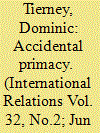

|
|
|
|
|
| Summary/Abstract |
Why did states fail to balance against the United States after the end of the Cold War? Scholars have neglected an important dynamic: the accidental nature of America’s rise to primacy. The United States became the sole superpower not by deliberately increasing its capabilities but due to the unexpected collapse of its rival, the USSR. The case illustrates that a state’s responsibility for its gains in power can vary significantly, with important consequences for subsequent balancing. Active or deliberate power increases tend to produce more balancing than passive power increases because they signal aggressive intentions, alter the dyadic power balance between the rising state and potential balancers, and trigger loss aversion.
|
|
|
|
|
|
|
|
|
|
|
|
|
|
|
|
| 2 |
ID:
079993
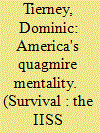

|
|
|
| 3 |
ID:
160237
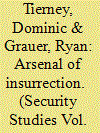

|
|
|
|
|
| Summary/Abstract |
Recent scholarship has established several key dynamics in civil wars: since the nineteenth century, rebel victories have increased in likelihood; external support is one of the most significant predictors of rebel victory; and rebel groups have become increasingly likely to receive foreign backing. What is missing is an explanation of why patterns of third-party aid to rebels changed over time. Data on foreign assistance to rebels over the last two centuries reveals the odds of groups receiving aid increased from about one in five to about four in five. The nature of the patron also altered significantly, from great powers, to lesser states, and then nonstate actors. We explain these patterns using three variables: (1) great-power competition; (2) norms of national self-determination; and (3) globalization. This paper explores this theory with a case study of aid to rebel groups in Algeria since the 1830s.
|
|
|
|
|
|
|
|
|
|
|
|
|
|
|
|
| 4 |
ID:
163808
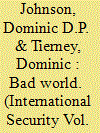

|
|
|
|
|
| Summary/Abstract |
A major puzzle in international relations is why states privilege negative over positive information. States tend to inflate threats, exhibit loss aversion, and learn more from failures than from successes. Rationalist accounts fail to explain this phenomenon, because systematically overweighting bad over good may in fact undermine state interests. New research in psychology, however, offers an explanation. The “negativity bias” has emerged as a fundamental principle of the human mind, in which people's response to positive and negative information is asymmetric. Negative factors have greater effects than positive factors across a wide range of psychological phenomena, including cognition, motivation, emotion, information processing, decision-making, learning, and memory. Put simply, bad is stronger than good. Scholars have long pointed to the role of positive biases, such as overconfidence, in causing war, but negative biases are actually more pervasive and may represent a core explanation for patterns of conflict. Positive and negative dispositions apply in different contexts. People privilege negative information about the external environment and other actors, but positive information about themselves. The coexistence of biases can increase the potential for conflict. Decisionmakers simultaneously exaggerate the severity of threats and exhibit overconfidence about their capacity to deal with them. Overall, the negativity bias is a potent force in human judgment and decisionmaking, with important implications for international relations theory and practice.
|
|
|
|
|
|
|
|
|
|
|
|
|
|
|
|
| 5 |
ID:
148591
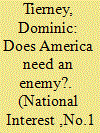

|
|
|
|
|
| Summary/Abstract |
IN THE first century BC, the Roman historian Sallust wrote that the republic had descended into internal strife because of the destruction of its enemy, Carthage, in the Third Punic War. Fear of the enemy, or metus hostilis, produced domestic cohesion. Without an adversary, Romans turned their knives inward: “when the minds of the people were relieved of that dread [of Carthage], wantonness and arrogance naturally arose.”
|
|
|
|
|
|
|
|
|
|
|
|
|
|
|
|
| 6 |
ID:
107804
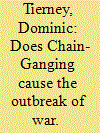

|
|
|
|
|
| Publication |
2011.
|
| Summary/Abstract |
Realists have argued that fears over the defection or defeat of an ally can draw states into wars against their broader interests ("chain-ganging"). However, the logic underpinning chain-ganging theory is flawed, and the paradigmatic case-World War I-is not an instance of chain-ganging causing the outbreak of war. The paper draws on recent literatures on alliance restraint and the origins of World War I to provide the first extensive critique of chain-ganging theory, examines the impact on chain-ganging of a number of factors including power and interests, and suggests policy implications for an emerging multipolar system.
|
|
|
|
|
|
|
|
|
|
|
|
|
|
|
|
| 7 |
ID:
105875
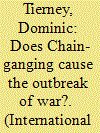

|
|
|
|
|
| Publication |
2011.
|
| Summary/Abstract |
Realists have argued that fears over the defection or defeat of an ally can draw states into wars against their broader interests ("chain-ganging"). However, the logic underpinning chain-ganging theory is flawed, and the paradigmatic case-World War I-is not an instance of chain-ganging causing the outbreak of war. The paper draws on recent literatures on alliance restraint and the origins of World War I to provide the first extensive critique of chain-ganging theory, examines the impact on chain-ganging of a number of factors including power and interests, and suggests policy implications for an emerging multipolar system.
|
|
|
|
|
|
|
|
|
|
|
|
|
|
|
|
| 8 |
ID:
118318
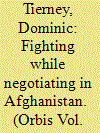

|
|
|
|
|
| Publication |
2013.
|
| Summary/Abstract |
America's experience of fighting while negotiating in the Korean War and the Vietnam War offers valuable lessons for understanding the current peace talks in Afghanistan: the adversaries are averse to making concessions; violence is a bargaining tool; the fate of captives can derail negotiations; alliances may be strained; broader regional dynamics are critical, and the peace process is imbued with symbolism.
In 2010, with the blessings of U.S. and British intelligence, the Afghan regime engaged in high-level peace talks with a senior Taliban leader, Mullah Akhtar Muhammad Mansour. Unfortunately, after handing over tens of thousands of dollars to encourage Mansour's participation, the supposed Taliban leader turned out to be an impostor. Who sent him, and for what reason, is unknown-although suspicions have fallen on the Pakistani intelligence services.
|
|
|
|
|
|
|
|
|
|
|
|
|
|
|
|
| 9 |
ID:
163954
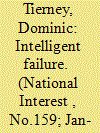

|
|
|
|
|
| Summary/Abstract |
The military's top officers may not be interested in failure, but failure is interested in them.
|
|
|
|
|
|
|
|
|
|
|
|
|
|
|
|
| 10 |
ID:
066912
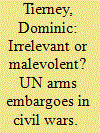

|
|
|
| 11 |
ID:
138599
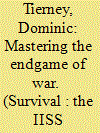

|
|
|
|
|
| Summary/Abstract |
In 1941 Japan weighed the merits of attacking the most powerful country in the world: the United States. It was a war of choice, and Tokyo had time to carefully consider the decision. Japanese leaders debated the best date to strike Pearl Harbor. And they also thought through the potential short-term effects. But Tokyo barely considered the military endgame: the final stages of a campaign in which an armistice is negotiated, hostilities cease and a new post-war order emerges.
|
|
|
|
|
|
|
|
|
|
|
|
|
|
|
|
| 12 |
ID:
110782
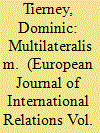

|
|
|
|
|
| Publication |
2011.
|
| Summary/Abstract |
When the United States faces loss or defeat in war, it is often loath to negotiate, make concessions to its adversary, and cut its losses. But the presence of allies and international organizations in the US coalition can help to correct this bias against compromise through a combination of simple bargaining, complex bargaining, and political cover. The costs of multilateralism can be considered a premium that is paid when operations are successful, so that the United States has an insurance policy to minimize loss in times of failure. The article contributes to a number of major debates over the costs and benefits of multilateralism and the impact of less powerful allies and international organizations on US foreign policy.
|
|
|
|
|
|
|
|
|
|
|
|
|
|
|
|
| 13 |
ID:
093919
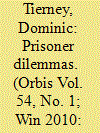

|
|
|
|
|
| Publication |
2010.
|
| Summary/Abstract |
For centuries, the issue of American hostages and POWs has had incredible emotional and political resonance. Driven by a combination of idealism, wrath, and concerns over reputation, the status of captive Americans can become a national obsession. While deeply moral in many respects, this intense focus can encourage risky rescue operations, deepen conflicts, and lead to more Americans being captured abroad. Jimmy Carter and Ronald Reagan both suffered grave political damage from hostage crises, and the recent capture of an American by Somali pirates highlights the continued danger that a hostage crisis could overshadow the presidency of Barack Obama. U.S. officials should publicly downplay the issue of hostages and POWs, and work quietly behind the scenes to free the men and women concerned.
|
|
|
|
|
|
|
|
|
|
|
|
|
|
|
|
| 14 |
ID:
136716
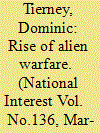

|
|
|
|
|
| Summary/Abstract |
From the War of 1812 to today’s campaigns in the Middle East, both Washington’s enemies and the local populations have become steadily less familiar in terms of language, religion and social traditions.
|
|
|
|
|
|
|
|
|
|
|
|
|
|
|
|
| 15 |
ID:
105976
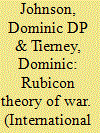

|
|
|
|
|
| Publication |
2011.
|
| Summary/Abstract |
A major paradox in international relations is the widespread fear and anxiety that underlies the security dilemma in times of peace and the prevalence of overconfidence or "false optimism" on the eve of war. A new theory of the causes of war-the Rubicon theory of war-can account for this paradox and explain important historical puzzles. The "Rubicon model of action phases," which was developed in experimental psychology, describes a significant shift in people's susceptibility to psychological biases before and after making a decision. Prior to making decisions, people tend to maintain a "deliberative" mind-set, weighing the costs, benefits, and risks of different options in a relatively impartial manner. By contrast, after making a decision, people tend to switch into an "implemental" mind-set that triggers a set of powerful psychological biases, including closed-mindedness, biased information processing, cognitive dissonance, self-serving evaluations, the illusion of control, and optimism. Together, these biases lead to significant overconfidence. The Rubicon theory of war applies this model to the realm of international conflict, where implemental mind-sets can narrow the range of bargaining options, promote overambitious war plans, and elevate the probability of war.
|
|
|
|
|
|
|
|
|
|
|
|
|
|
|
|
| 16 |
ID:
163357
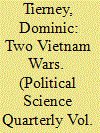

|
|
|
|
|
| Summary/Abstract |
HOW DO AMERICANS PERCEIVE AND UNDERSTAND WAR? Dominic Tierney contended that Americans tend to favor interstate wars and support escalation for decisive victory (the “crusade” mind‐set), whereas they oppose nation‐building and counterinsurgency missions in the midst of a civil war and usually view the outcome as a failure (the “quagmire” mind‐set).
The Vietnam War is a valuable case for exploring this claim because the conflict could be perceived as either an interstate war or a civil war. “No question in the entire debate over Vietnam was more hotly disputed than this one,” wrote David Levy, “because both sides could see that the moral authority of the undertaking depended directly upon what was believed.”2 Tierney's theory predicts that Americans who saw the mission primarily as an interstate war will have adopted the crusade mind‐set with a number of positive associated beliefs, including higher levels of support. Meanwhile, Americans who saw the campaign primarily as a civil war will have adopted the quagmire mind‐set with a number of negative associated beliefs, including lower levels of support. In other words, people are expected to have looked at the same essential set of facts about blood and treasure expended but reached very different conclusions depending on which frame they highlighted.
|
|
|
|
|
|
|
|
|
|
|
|
|
|
|
|
| 17 |
ID:
162749
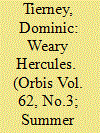

|
|
|
|
|
| Summary/Abstract |
Since the 9/11 attacks, the United States has tended to engage in regime change missions with a short-term and improvisational approach that focuses on removing adversaries from the battlefield rather than achieving consolidated political gains. Today, Washington may repeat the same mistake by prioritizing the military destruction of ISIS, rather than creating a tolerable political order. The policy challenges are particularly acute because, like a weary Hercules, Washington is confronted with endless labor, but limited capability. The answer is to pursue a long-term strategic approach that aligns the ends and means of war, seeks ugly stability rather than illusory goals, accepts that nation-building in some form is inevitable, and wins the narrative war.
|
|
|
|
|
|
|
|
|
|
|
|
|
|
|
|
| 18 |
ID:
188127
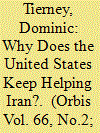

|
|
|
|
|
| Summary/Abstract |
Since the Jimmy Carter administration, Iran has been America’s most consistent enemy. Strangely, however, the United States repeatedly helps its opponent. Following the 9/11 attacks, Washington aided Iran’s interests in six episodes: toppling the Taliban; overthrowing Saddam Hussein; suppressing the ISIS caliphate; backing the Saudi intervention in Yemen; withdrawing from the Iran nuclear deal, and assassinating the Iranian general Qasem Soleimani. Of course, Washington does not deliberately assist its opponent. Rather, the United States unintentionally helps Iran by creating power vacuums, into which Tehran steps, and triggering power surges, or coercive campaigns against Iran, which also tend to backfire and bond Iran more closely with third parties.
|
|
|
|
|
|
|
|
|
|
|
|
|
|
|
|
| 19 |
ID:
178969
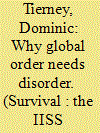

|
|
|
|
|
| Summary/Abstract |
Hegemonic-stability theorists see a single uncontested state as the key for global order, but it is precisely contestation that impels a powerful actor to build and sustain the liberal order.
|
|
|
|
|
|
|
|
|
|
|
|
|
|
|
|
| 20 |
ID:
181343
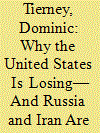

|
|
|
|
|
| Summary/Abstract |
At a press conference in 2015, Barack Obama predicted that Russian intervention in Syria would end in ignominy and Moscow would be “stuck in a quagmire.”1 Rather than repeat America’s own tough experience in recent Middle Eastern wars, however, the Russian operation helped Syrian president Bashar al-Assad seize the initiative and recapture Aleppo. Since the 9/11 attacks, major American wars in Afghanistan, Iraq, and Libya have all been strategic failures. During the same period, however, US rivals Russia and Iran achieved significant success during campaigns in Georgia, Ukraine, Syria, and Iraq. Why does the United States lose, whereas Russia and Iran win?
|
|
|
|
|
|
|
|
|
|
|
|
|
|
|
|
|
|
|
|
|